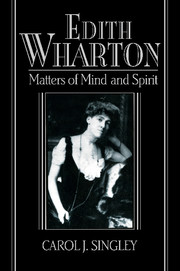22 results
4 - Worst Parents Ever: Cultures of Childhood in The Custom of the Country
-
-
- Book:
- Edith Wharton's The Custom of the Country
- Published by:
- Pickering & Chatto
- Published online:
- 05 December 2014, pp 59-70
-
- Chapter
- Export citation
17 - American literary Realism
- from IV - Later nineteenth-century developments: Realism, Naturalism, Symbolism and Decadence
-
-
- Book:
- The Cambridge History of Literary Criticism
- Published online:
- 05 February 2013
- Print publication:
- 07 February 2013, pp 331-339
-
- Chapter
- Export citation
Notes on contributors
-
-
- Book:
- The Cambridge History of Literary Criticism
- Published online:
- 05 February 2013
- Print publication:
- 07 February 2013, pp ix-xiv
-
- Chapter
- Export citation
Notes on Contributors
-
-
- Book:
- Edith Wharton in Context
- Published online:
- 05 November 2012
- Print publication:
- 08 October 2012, pp ix-xvi
-
- Chapter
- Export citation
Chapter 29 - Wharton and the Great Depression
- from Part VI - Time and Place
-
-
- Book:
- Edith Wharton in Context
- Published online:
- 05 November 2012
- Print publication:
- 08 October 2012, pp 312-322
-
- Chapter
- Export citation
CAMBRIDGE STUDIES IN AMERICAN LITERATURE AND CULTURE
-
- Book:
- Edith Wharton
- Published online:
- 06 August 2010
- Print publication:
- 28 July 1995, pp 263-265
-
- Chapter
- Export citation
Coda
-
- Book:
- Edith Wharton
- Published online:
- 06 August 2010
- Print publication:
- 28 July 1995, pp 209-212
-
- Chapter
- Export citation
5 - Platonic Idealism
-
- Book:
- Edith Wharton
- Published online:
- 06 August 2010
- Print publication:
- 28 July 1995, pp 163-183
-
- Chapter
- Export citation
Introduction
-
- Book:
- Edith Wharton
- Published online:
- 06 August 2010
- Print publication:
- 28 July 1995, pp 1-40
-
- Chapter
- Export citation
Frontmatter
-
- Book:
- Edith Wharton
- Published online:
- 06 August 2010
- Print publication:
- 28 July 1995, pp i-vi
-
- Chapter
- Export citation
Edith Wharton
-
- Book:
- Edith Wharton
- Published online:
- 06 August 2010
- Print publication:
- 28 July 1995, pp xv-xvi
-
- Chapter
- Export citation
4 - Fragile Freedoms
-
- Book:
- Edith Wharton
- Published online:
- 06 August 2010
- Print publication:
- 28 July 1995, pp 127-162
-
- Chapter
- Export citation
6 - Catholicism: Fulfillment or Concession?
-
- Book:
- Edith Wharton
- Published online:
- 06 August 2010
- Print publication:
- 28 July 1995, pp 184-208
-
- Chapter
- Export citation
Notes
-
- Book:
- Edith Wharton
- Published online:
- 06 August 2010
- Print publication:
- 28 July 1995, pp 213-231
-
- Chapter
- Export citation
Index
-
- Book:
- Edith Wharton
- Published online:
- 06 August 2010
- Print publication:
- 28 July 1995, pp 249-262
-
- Chapter
- Export citation
1 - Priestess of Reason
-
- Book:
- Edith Wharton
- Published online:
- 06 August 2010
- Print publication:
- 28 July 1995, pp 41-66
-
- Chapter
- Export citation

Edith Wharton
- Matters of Mind and Spirit
-
- Published online:
- 06 August 2010
- Print publication:
- 28 July 1995
Works Cited
-
- Book:
- Edith Wharton
- Published online:
- 06 August 2010
- Print publication:
- 28 July 1995, pp 232-248
-
- Chapter
- Export citation
Contents
-
- Book:
- Edith Wharton
- Published online:
- 06 August 2010
- Print publication:
- 28 July 1995, pp vii-viii
-
- Chapter
- Export citation
3 - Calvinist Tortures
-
- Book:
- Edith Wharton
- Published online:
- 06 August 2010
- Print publication:
- 28 July 1995, pp 89-126
-
- Chapter
- Export citation

